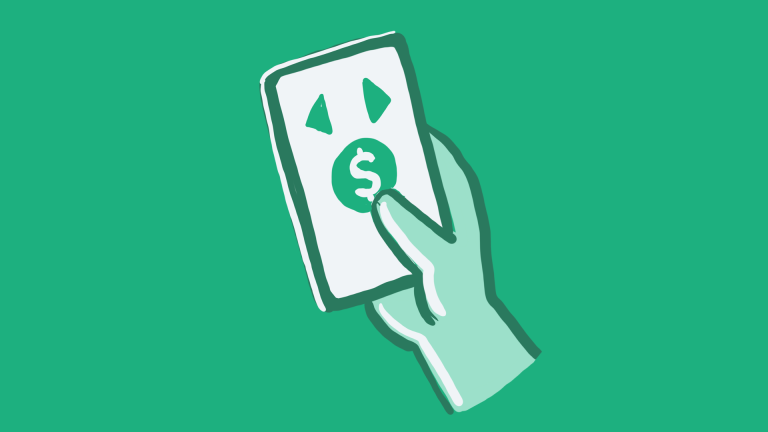Here's Your Guide to Sports Betting and Everything Else to Know About Gambling in California

In California, you can bet on a horse race, buy a lottery ticket, put money on poker in a card room and play slots at a tribal casino all in the same — potentially expensive — day.
Nevada, right next door, is undoubtedly the national capital of all things gambling. But after Nevada, California has the most slot machines of any state — one measure of the state's betting industry.
The gambling industry, like many, took a hit during the pandemic. Nationally, commercial gaming revenue after winnings shrank by more than 25% between 2019 and 2020. Then, in 2021, it came roaring back — even faster than the rest of the economy — and brought in more money than any previous year. Tribal casinos also had a record-breaking year in 2021.
During this year's November election, Californians will decide whether they want to expand gambling further and allow sports betting. A pitched battle between gaming companies, tribes, card rooms and others has broken campaign cash records and has landed two separate initiatives to legalize sports betting on the ballot.
Here's what you need to know about gambling in California.
What Can You Bet On Legally, and Where
When it comes to gambling in California, you have options.
Tribal Casinos
At 69 licensed tribal casinos you can play slots, lottery games and card games, like baccarat and blackjack, where players bet against the house, as well as games like poker, where players bet against each other.
Card Rooms
At 84 licensed card rooms, you can play games like poker and pai-gow, where players bet against each other. Card rooms can also offer some non-card game options, like drawings. They can’t offer games where players bet against the house.
Lottery
At about 23,000 retailers across the state, including convenience stores and gas stations, you can buy scratchers and fill out tickets for drawings, such as MegaMillions and PowerBall.
Horse Racing
You can bet on horse races at one of the state’s four private horse racing tracks, one of its five racing fairs or at one of its 23 simulcast locations, where you can watch the race on TV and place a bet. You can also place a bet from home — or anywhere — with online advance deposit wagering.
Charitable Gaming
Certain nonprofits can host card nights and raffles for charitable purposes, and cities and counties can choose to allow bingo for charitable purposes.
How Big of a Problem Is Gambling Addiction?
Problem gambling "includes all gambling behavior patterns that compromise, disrupt or damage personal, family or vocational pursuits," according to the National Council on Problem Gambling. A survey commissioned by California in 2006 found that 3.7% of Californian adults will experience problem or pathological gambling at some point in their lives, which translates to about 1.1 million adults in 2020. The state hasn’t commissioned a study since. The 2006 survey also found that the prevalence of problem or pathological gambling was higher among men, African Americans, unemployed people and disabled people.
Gambling addiction can cause a cascade of other problems in a person’s life, including mental health issues, increased use of drugs or alcohol, financial problems and strained relationships. Some take on debt to fuel their habit. Out of the roughly 2,549 people who called California’s problem gambling hotline in 2019 for themselves or someone they knew, gamblers had taken on an average debt of about $24,000. Their average household income was around $74,000.
There are several options for getting help. California has a free hotline people can call to get support and get connected to resources (1-800-426-2537, or 1-800-GAMBLER). There’s also Gamblers Anonymous, which is a support group program like Alcoholics Anonymous, as well as Gam-Anon, a support system for friends and family members of gamblers. California also has a program that provides free treatment — including counseling, outpatient and residential treatments — to gamblers or people affected by problem gambling, which includes spouses and family members. Health insurance isn’t required.
History of Gambling in California
What’s the Deal with Sports Betting?
Everything changed in 2018, when the U.S. Supreme Court ruled that states could legalize betting on sports. Since then 36 states plus the District of Columbia have legalized some form of sports betting, either in person, online or both.
Some common bets include:
- Moneyline: Bet on a team to win a game
- Point spread: Bet on a team winning or losing a game by a certain number of points, goals, runs, etc.
- Over/Under: Betting that the two teams combined will rack up more or less than a certain number of points, goals, runs, etc.
- Parlay: Multiple bets linked together. Bettors need to win each individual bet to get the payout.
- Prop bets: A broad category of bets on things that can happen during a game, but aren’t tied to the game’s final result. Which team will be the first to score? How many touchdowns will Patrick Mahomes of the Kansas City Chiefs throw?
For some big games, there are even prop bets that don’t relate to what happens on the field. Like: How long will the national anthem be at the Super Bowl, or what color of Gatorade will get dumped on the winning coach?
Among Americans over 21, 25% had bet on sports when Morning Consult conducted a poll in December 2021, and 18% said they were betting on sports at least monthly. That’s up from 10% betting monthly when Morning Consult polled in January of 2021.
Even within states that allow online sports betting, 55% of online sports bettors use an unregulated platform at least some of the time, according to a May 2022 survey conducted by research firm Leger’s, commissioned by the Fantasy Sports & Gaming Association.
Sports Betting Legalization on the Ballot in California
California lawmakers tried to negotiate a deal on sports betting in 2020, but it didn’t work out. So this November, voters will have the chance to weigh on two different initiatives that would legalize sports betting.
Prop 26, paid for by Indian tribes, would legalize sports betting only at tribal casinos and the state’s four private horse race tracks. It would also allow tribal casinos to begin offering roulette and dice games, including craps. And it would create a new pathway to enforce some gaming laws, via lawsuits. According to the Legislative Analyst’s Office, the proposition could generate as much as tens of millions annually for the state.
Prop 27, paid for by national gaming companies, would legalize mobile and online sports betting outside of Native American tribal lands. It would also create a new division at the state Department of Justice to regulate sports betting. The proposition could generate somewhere in the mid-hundreds of millions annually for the state, but likely not more than $500 million per year, according to estimates by the Legislative Analyst’s Office.
If both propositions pass, both could go into effect, but odds are that a court would end up weighing in.
Casinos Are Important Source of Revenue for Tribes
California has the largest tribal gaming sector of any state, as measured by sales, according to a 2018 report from the American Gaming Association.
Federally recognized tribes can offer gambling, like slot machines, lottery games and card games if they negotiate a tribal-state compact with the governor. Compacts flesh out details like how state regulators are allowed to inspect casinos and how much gaming revenue tribes share with the state of California or local governments.
There are limitations on what tribes can spend gaming proceeds on, focused on the welfare of the tribe and its members, the operations of its government, economic development, charity and local government agencies.
For the Cahuilla Band of Indians, a tribe in Southern California, their casino and hotel, combined with a gas station on their reservation, bring in about 75% of the tribal government’s budget, said Chairman Daniel Salgado. That goes to social services, like child dependency cases; the public works department, which just paved the reservation’s first road about a year and a half ago; the fire department, and more, said Salgado. Because the tribe has fewer than 350 gaming machines, it receives $1.1 million a year from the Revenue Sharing Trust Fund, which tribes with large gaming operations pay into for tribes with limited or no gaming, Salgado said.
In 2016, tribal casinos in California supported 124,274 jobs and sold $19.96 billion worth of goods and services — including non-gambling sales like hotel rooms, drinks and entertainment — according to the American Gaming Association.
How Much Does the California Lottery Support Education?
At convenience stores and gas stations across the state, you can buy lottery tickets and scratchers. Lottery sales have climbed steadily in recent years, from about $3 billion in 2008 to about $7 billion in 2017.
Californians voted to create a lottery in part to support public education. K-12 schools receive the lion’s share of the lottery funds going to education and they largely use the money on teacher salaries and instructional materials. However, money from the lottery contributes a very small portion of overall K-12 funding, about 1%. In the 2020-21 budget year, the lottery gave $1.8 billion to public schools.
What is a Card Room?
Card rooms, also known as card clubs, are businesses across the state that offer card games like poker and pai gow where players bet against one another. They’ve existed in some form since before California became a state, and were particularly popular during the Gold Rush era. Unlike tribal casinos, card rooms can’t offer slot machines or games where players bet against the house.
Card rooms have sometimes run afoul of the law. In 2021, Artichoke Joe’s Casino, a card room in San Bruno, paid a $5 million federal penalty and agreed to pay a $5.3 million settlement with the California Department of Justice for misleading regulators and violating a federal law aimed at combating money laundering. The card room’s violations had gone on for eight years. Several card rooms were ordered to close in 2020 for failing to follow state COVID-19 orders. And in 2019, Hawaiian Gardens Casino, one of the largest card rooms in the state, settled with state attorney for $3.1 million for misleading gambling regulators and paid $2.8 million for violating a federal anti-money laundering law.
Some card rooms are a major source of revenue for the local government of the city they are in. The city of Hawaiian Gardens, for example, received about 70% of its revenue from The Gardens Casino in its 2019-2021 budget.
Via CalMatters
Betting on Horse Racing Declines
At fairs and private race tracks across the state, you can watch horses shoot out of the starting gates and hear the thunder of hooves.
You can, however, bet on those races from 23 casinos and county fairs around the state, or even from home. People outside the state can bet on races taking place in California as well. It’s the only form of sports betting currently allowed in the Golden State.
The most common bets on horse races are:
- "Win," where you bet on a horse to win the race
- "Place," where you bet on a horse to come either first or second in a race
- "Show," where you bet on a horse to come in first, second or third.
Animal welfare advocates have taken issue with the sport, especially after a spike in horse deaths at the Santa Anita horse race track in 2019. Forty-two horses died at that track alone that year, causing concern and spawning regulatory change. State lawmakers made it easier for the state to suspend racing licenses. The state board that regulates racing also enacted a new rule restricting how often jockeys can whip horses, put more limits on drugs horses can be given before races, among other changes.
In the wake of the new rules, horse deaths fell dramatically, from 144 during the 2018-19 season, to 72 during the 2020-21 season.
This article was originally published by CalMatters.








